Jessica Coady, 17, joined a choir this spring unlike any she had ever seen before. Besides high-school students such as herself, the choir gathered together singers in mid-life and older adults with dementia.
But in the first few rehearsals, as they learned pieces ranging from Second World War ballads to African songs, “it was actually a bit of a struggle to tell who had Alzheimer’s.”
Breaking down misconceptions about dementia was part of the idea, said psychologist Stuart MacDonald, one of the University of Victoria researchers behind this intergenerational choir for people with dementia, their caregivers and high-school students in Victoria, B.C.
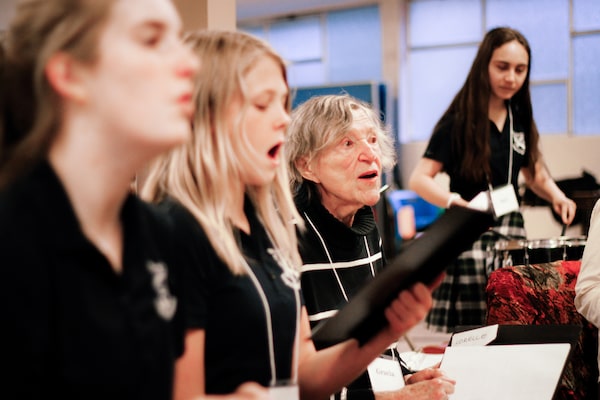
Gracia Seal (centre) and St. Andrew's Regional High School students Jessica Coady(left), Claire O'Neill and Mari Chambers on percussion, practice with the Voices in Motion intergenerational choir project led by University of Victoria researchers.Suzanne Ahearne/UVic
Even as they go through cognitive decline, people living with dementia “laugh, they sing with amazing fervour, they share stories.”
Another goal behind the choir, said MacDonald, who specializes in lifelong health, was to combat the high levels of stress, depression and social isolation that affect people living with dementia, as well as their caregivers.
MacDonald and colleagues set up the choir this spring as part of a two-year community research project called Voices in Motion. They measured physical and emotional changes in caregivers and choir members with dementia over the 14-week choir season.
In their unpublished data, researchers found a drop in depression among caregivers who sang in the choir, and a more modest decline in those with dementia. Both caregivers and participants with dementia showed small improvements in their ability to recall words from a list.
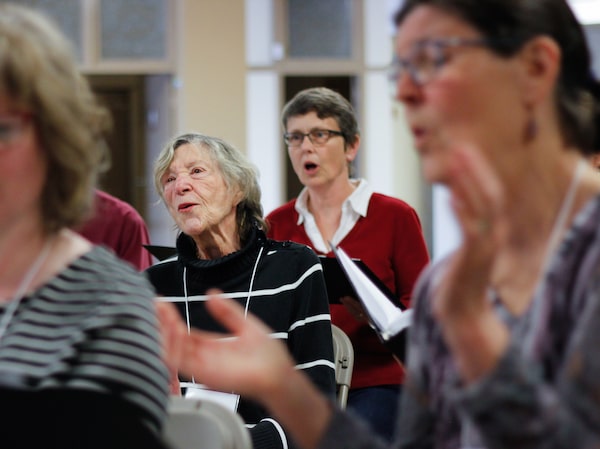
Gracia Seal (centre) and her daughter Lorelle Sihota (left) are participants in the Voices in Motion intergenerational choir and research project led by University of Victoria researchers.Suzanne Ahearne/UVic
MacDonald emphasized that music cannot halt the progression of Alzheimer’s and other dementias. But if singing in a choir proves to reduce depression and stress, “you might be freeing up some of their available [brain] resources so they actually show a bump in terms of their cognitive function.”
The choir included 14 pairs of caregivers and individuals with early to moderate dementia, and 18 students from St. Andrews Regional High School, a Catholic school in Victoria.
Debra Sheets, a professor of nursing and one of the lead researchers, noted that families coping with dementia often lack opportunities for meaningful social interactions. She remembers seeing her parents’ circle of friends fall away as her father lived with dementia for 17 years. Eventually, a big outing for him consisted of “going to Costco and pushing the cart around.”
The Voices in Motion choir offered a social outlet combined with a challenging activity. “It’s not a singalong,” she said.
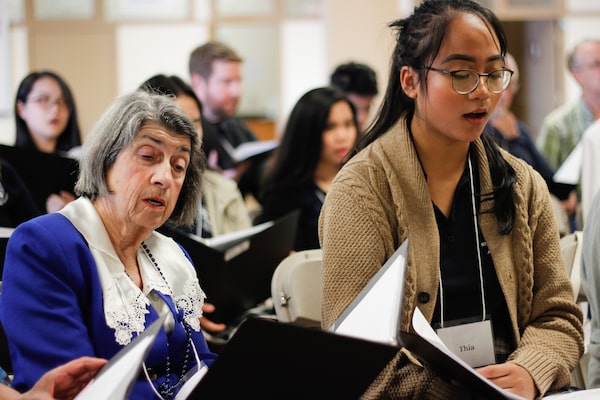
Isabel Philips (left) and St. Andrew's Regional High School student Thia Lanuza are participants in the Voices in Motion intergenerational choir and research project led by University if Victoria researchers.Suzanne Ahearne/UVic
Choir members met every Wednesday for a two-hour rehearsal and agreed to practice their parts at home to prepare for a performance in early May at a neighbourhood church.
Lorelle Seal, 58, signed up for the choir with her 88-year-old mother, Gracia, diagnosed with dementia last year.
Her mother, who had sung in a choir as a child and played violin, can no longer remember people she sees regularly, or cook for herself – not even macaroni and cheese. But she had no trouble learning new songs, including a 2003 Josh Groban hit called “You Raise Me Up,” Seal said.
Choir members got a chance to mingle during cookie breaks. They received binders of sheet music and CDs of songs to help them practice at home.
The choir was a major commitment, however. Caregivers and participants with dementia agreed to monthly tests designed to detect changes in mental functioning and mood, as well as psychological measures such as gait, grip strength and peak expiratory flow rate (how fast a person can exhale).
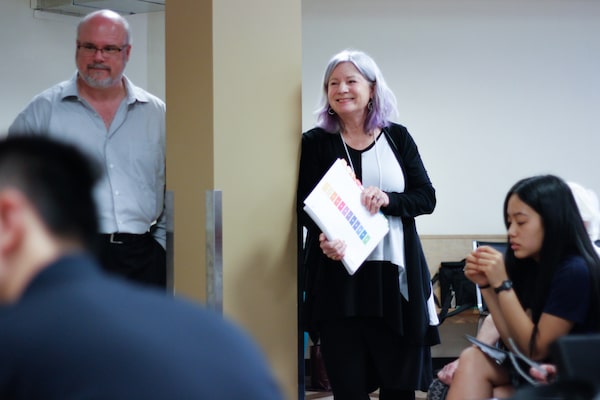
Debra Sheets (centre), University of Victoria nursing professor and affiliate of UVic's Institute on Aging and Lifelong Health, is the lead researcher of the Voices in Motion intergeneration choir and research study along with UVic sociologist Andre Smith (left) and others.Suzanne Ahearne/UVic
The researchers plan to run three more choirs this fall to study the model’s potential as an inexpensive way to enhance quality of life.
Previous research has shown that singing with others raises levels of oxytocin – the “cuddle hormone” – associated with increased feelings of trust and co-operation.
Music taps into a range of memory, emotion and motor systems in the brain, which makes for an activity that is “incredibly resistant to forgetting,” MacDonald said.
He noted that choir members with dementia were “absolutely able to learn” new songs. Despite damage to brain areas involved in forming new memories, these participants may have relied on other brain areas, including emotional and procedural memory centres, to recall new repertoire week after week.
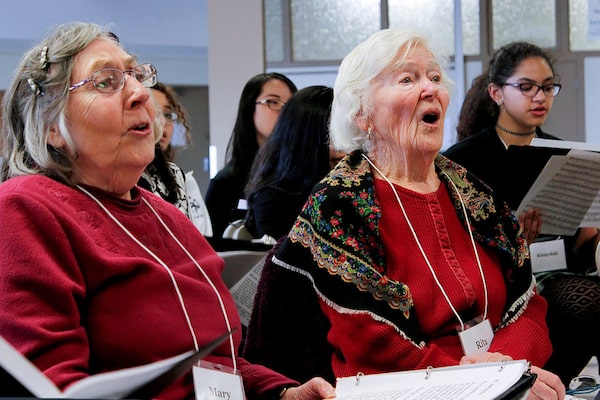
Mary Peters (left) and Rita Goodman are participants in the Voices in Motion intergenerational choir and research project led by UVic researchers.Suzanne Ahearne/UVic
Coady said she originally joined the group to fulfill her school’s community service requirement, but discovered she liked meeting people from different generations. One choir member shared her story of being in a bunker during the war.
Seal said she’d like to continue singing in one of the new choirs with her mother this fall if the groups are open to return members. Her mother particularly enjoyed chatting with the high school students, she said. “She loved going.”